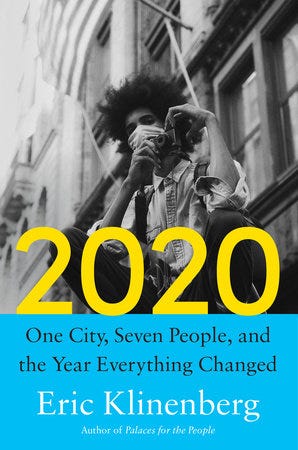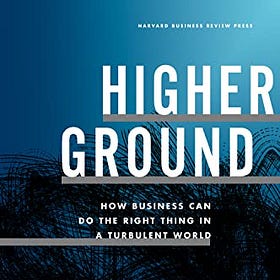Why 2020 is the year everything changed: An Interview with Eric Klinenberg
Issue 105: Eric Klinenberg on how 2020 reveals that we all make choices, but we don't get to choose the choices we have to choose from.
We all recently lived through one of the most transformative years in history: 2020. It was a year of global upheaval, where the threads of human resilience intertwined with tragedy, uncertainty, and collective action. Scholars are already reflecting on the year and are starting to see how the events of 2020 have shaped our society today and will continue to shape it well into the future. We have studied how national identity and partisan polarization played into the response to the pandemic and also the threats to democracy that unfolded toward the end of 2020. So we we excited to feature a new book that brought together all these topics.
In “2020: One City, Seven People, and the Year That Changed Everything“, award-winning author and NYU sociologist Eric Klinenberg presents a meticulously reported, character-driven investigation of a time when nothing was certain and everything was at stake. At the heart of 2020 are seven vivid profiles of ordinary New Yorkers—including an elementary school principal, a bar manager, a subway custodian, and a local political aide—whose experiences illuminate how Americans, and people across the globe, reckoned with 2020.
“Remember this big sociological idea: We all make choices, but we don't get to choose the choices we have to choose from.” —Eric Klinenberg
Through these poignant stories, readers will revisit their own moments of hope and fear, the profound tragedies and losses in their communities, the mutual aid networks that brought them together, and the social movements that hinted at the possibilities of a better world. One of our own stories from 2020—about Jay getting trapped in an elevator with his kids and teaching a class from his phone—combined a moment of hope and fear.
This week, we are excited to offer a preview of Eric’s writing process and motivations to write his book, which is out today! Learn more about the book “2020” here and find it on Amazon here.
What does your book teach us about social identity or group dynamics?
The book is about the cascading crises of 2020: the pandemic, of course, but also the murder of George Floyd and its political aftermath, the assault on democracy in the 2020 election, the spike in violence, the hollowing out of cities, and—on the flip side—the extraordinary rise of mutual aid networks. I tracked the experiences of seven people across New York City, one from every borough plus a Black Lives Matter activist and an MTA custodian. Their stories illustrate how who you are, where you live, and who you know shaped the experience of that fateful year, in some cases determining who could protect themselves and who was exposed to everything, who worked in high-risk situations and who stayed home, who lived and who died.
There are a few characters whose identity proved especially salient. One is a Black family in which the father, Persol, worked as a corrections officers on Rikers Island. When the pandemic started, his daughter's home daycare closed down but he had no choice but to continue working. Inevitably, he and his wife, Enuma, got COVID, and she wound up in the hospital. They survived, but they struggled to find help for their daughter while the daycare was closed. One day, in a park, they found out that the daycare had actually reopened, but that they had been excluded from the announcement. Why? Because Persol was an essential worker, and the community—supposedly committed to social justice and inclusion—had deemed their family a disease vector because of his job. They didn't want his child there, and they simply iced them out. Identity matters.
The book also tells the story of a bar manager on Staten Island who gets radicalized towards right-wing conservatism over the course of 2020, as city and state business restrictions make it impossible for him to earn a living and his world collapses. He gets none of the support he needs from New York's liberal establishment, but finds companions who rally to his cause on the right. His life changes. He becomes a minor celebrity, embraced by Fox News hosts and conservatives in his community. His life transforms. It's a story I think we need to understand better, especially this election year.
What is the most important idea readers will learn from your book?
The year 2020 traumatized and changed us. But so much happened, at such incredible pace, that it was too much to make sense of and process in real time. There's an urgent need for us to reckon with what happened, to understand why we've grown so much more divided, distrustful, and quick-tempered, as well as why so many people are seeking new ways to revive our civic life.
Why did you write this book and how did writing it change you?
I wrote this book both to help dispel some of our misconceptions about mindset and to share these new insights about the fact that mindset isn’t just something that lives inside people’s heads—groups, teams, classrooms, and organizations have their own mindset culture. In my decade of research on this topic and in writing the book, I realized just how toxic the old mythology around mindset can sometimes be. Specifically, with our hyper-focus on individual agency, we’re told that if something’s wrong, we just need to fix our mindset. That it’s all up to us. That’s a common meme throughout the self-help and personal development industry. And there’s truth to that in that we are do have the ability to create change. Yet when we focus entirely on the individual, we completely overlook the influence of the surrounding culture, and that means our personal efforts can only get us so far. Our research shows that people can have the strongest possible growth mindset personally, but if they are embedded in a fixed-minded Culture of Genius, they will not have opportunities to use or benefit from their growth mindset.
Writing the book changed me by exposing me to so many people—everyday people and those in more formal leadership positions—who are trying to shift from a fixed-minded Culture of Genius to a development-oriented Culture of Growth. By hearing their stories and learning what worked in these contexts—and how it dovetailed with the literature and research base, I became convinced that creating Cultures of Growth in our families, groups, teams, schools, and organizations could change the world for the better.
What will readers find provocative or controversial about your book?
I just published an essay about the book in the New York Times, and within hours I was accused of being: a fascist, because I did not denounce a right-wing extremist; apolitical, because I did not condemn Trump strongly enough; a socialist, because I criticized American individualism; woke, because I wrote about racial inequality; and naive, because I believe vaccines helped keep the death rate down. So, plenty.
Do you have any practical advice for people who want to apply these ideas (e.g., three tips for the real world)?
Remember this big sociological idea: We all make choices, but we don't get to choose the choices we have to choose from.
News and Updates
In the spirit of 2020, here is the story of the time Jay taught class while stuck in the elevator with his kids. At the time it didn’t seem like a big deal, but his daughter mentioned the experience to a friend, who mentioned it to her mom, who texted Jay to say it was a wild story, so he shared it on Twitter and the story went viral.
Jay was asked to summarize his experience for Business Insider in an article that was read by over half a million people and this led to his interview on the Kelly Clarkson show. You can check it out below:
Learn more about THE POWER OF US
If you like our newsletter, we encourage you to check out our award-winning book “The Power of Us: Harnessing Our Shared Identities to Improve Performance, Increase Cooperation, and Promote Social Harmony”. You can learn more about the book or order it from the links on our website (here or scan the QR code below). We keep the newsletter free, but are extremely grateful if you have a chance to purchase the book or buy it for a friend this holiday season who wants to learn more about group psychology.
Catch up on the last one…
Last week, Alison Taylor outlined the building blocks and strategies of ethical business in the 21st Century. Read her interview below for insights into fostering integrity and responsibility within organizations.
How Business Can Do the Right Thing: An Interview with Alison Taylor
Our news feeds are full of stories about employee unrest over racial injustice, communities infuriated by corporate environmental impacts, staff anxious over employer surveillance, and discoveries of child labor in supply chains. Simply aiming to maximize shareholder value without breaking the law is no longer sufficient for effective organizational lea…





